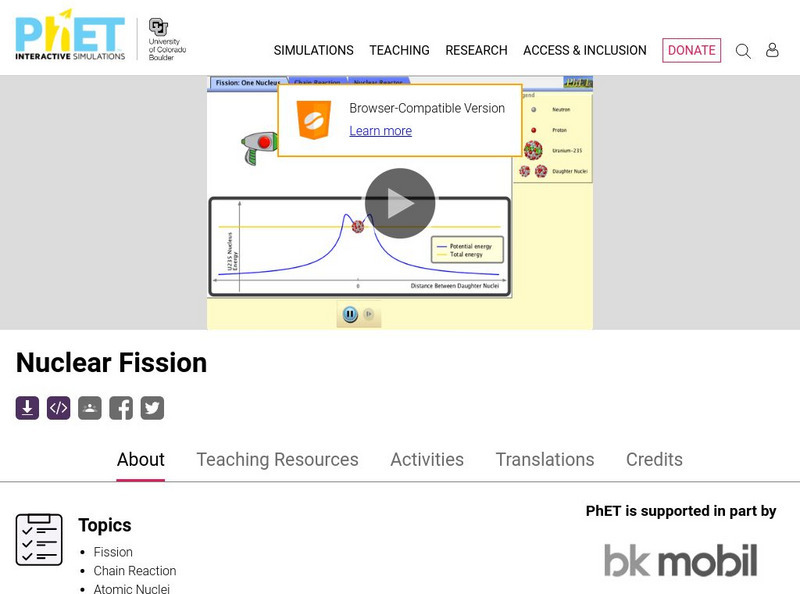Hi, what do you want to do?
Virginia Department of Education
Determining Absolute Age
How can radioactive decay help date old objects? Learners explore half-life and radioactive decay by conducting an experiment using pennies to represent atoms. Young scientists graph data from the experiment to identify radioactive decay...
Curated OER
Mining Uranium and Nuclear Reactor
In this mining worksheet, students fill in the blanks to paragraphs about mining uranium and a nuclear reactor. Students fill in the blanks for 17 sentences.
Curated OER
Cut-Off Genes
Students explain the concept of gene sequence analysis. For this gene lesson, students draw inferences about phylogenetic similarities of different organisms.
Curated OER
Photosynthesis
Students conduct experiments with plants. For this photosynthesis lesson, students examine plants under different types of lights. They calculate the amount of dissolved ocygen concentration and compare it to the formula for...
Cornell University
Glued into Science—Classifying Polymers
Explore the unique characteristics of polymers. A complete lesson begins with a presentation introducing polymers. Following the presentation, young scientists develop a laboratory plan for creating substances using polymers. They...
Virginia Department of Education
Soap, Slime, and Creative Chromatography
Do you think chromatography paper suffers from separation anxiety? Young chemists make soap, slime, silly putty, and experiment with chromatography in this lesson. The material includes clear instructions for each experiment along with...
Curated OER
Chemistry of Carbon
After giving basic details about the properties of carbon, some of the common functional groups and molecules are featured. There is some information about specific functions and impact on the human body. The diagrams are helpful and...
Curated OER
Chemistry of Carbon: Building Blocks of Life
After giving basic details about the properties of Carbon, some of the common functional groups and molecules are featured. There are some details about specific functions and impact on the human body. The diagrams are helpful and could...
Curated OER
Ammonium Nitrate- Stoichiometry
High schoolers quantify the relationship between moles and mass. They comprehend that ammonium nitrate is used as a fertilizer and an explosive. Students study the chemistry of ammonium nitrate and consider the advantages and...
University City High School
Metabolism Lesson Plan
Not a lesson in the traditional sense, this is a collection of resources with which you can craft a lesson on metabolic processes. It includes an outline of topics, some brief discussion, and a large array of animations, images, and...
Curated OER
What Should I Know about Respiration
How are kids supposed to know what to study for that cellular respiration test? With a study guide or reading guide like the one found here. With three pages of questions important to the understanding of respiration and the processes...
Curated OER
Plant Pigments
Students investigate the components of chlorophyll. They use paper chromatography to separate the many pigments of chlorophyll from one another.
Curated OER
Physical vs. Chemical Changes
In this chemical and physical change worksheet, learners are given details about chemical and physical changes. They are given 2 examples using water and salt and they identify 15 statements as chemical or physical changes. Students...
Curated OER
Plankton / Phytoplankton
Young scholars discuss the importance of plankton in the ocean ecosystem. In this biology lesson plan, students identify the different types plankton by observing them under the microscope. They explain how plankton population affect...
Curated OER
Enzymes
Students explore enzymes and what can inhibit and act as a catalyst for them. In this enzymes lesson students complete experiments on enzyme properties.
Curated OER
Photosynthesis: How do plants make food?
Young scholars study why plants are green and how water is transported in them. They examine how plants respond to different amounts of light.
Curated OER
The Chemistry of Life
In this chemistry of life worksheet, students will review key terms of plant cell structure and chemistry by reading 13 clues to complete the puzzle. Word bank is included.
Curated OER
Moore S Word Search Puzzle 1
In this literacy instructional activity, learners find the words that are in the word search puzzle that focus upon the vocabulary that is from the theme of the sheet.
Science Buddies
Science Buddies: Popsicle Stick Chain Reaction
Activity uses tongue depressors to set off a chain reaction of sticks flying in the air.
Chiral Publishing
Chiral Publishing: An Introduction to Chemistry: Nuclear Energy: Audio Book
Listen and learn as you view examples and explanations of nuclear energy. View examples and formulas for binding energy, nuclear fission, chain reaction, and nuclear power.
Khan Academy
Khan Academy: The Light Dependent Reactions
Article explores the light-dependent reactions as they take place during photosynthesis in plants. Traces how light energy is used to make ATP and NADPH and explains photosystems and electron transport chains.
University of Colorado
University of Colorado: Ph Et Interactive Simulations: Nuclear Fission
Start a chain reaction, or introduce non-radioactive isotopes to prevent one. Control energy production in a nuclear reactor.
National Institutes of Health
Ncbi: Amino Acids Are Linked by Peptide Bonds to Form Polypeptide Chains
Proteins are linear polymers formed by linking the a-carboxyl group of one amino acid to the a-amino group of another amino acid with a peptide bond. The formation of a dipeptide from two amino acids is accompanied by the loss of a water...
CK-12 Foundation
Ck 12: Physical Science: Nuclear Fission
[Free Registration/Login may be required to access all resource tools.] What happens during nuclear fission and what a nuclear chain reaction is. How nuclear fission can be used to produce energy and the pros and cons of using that energy.



























